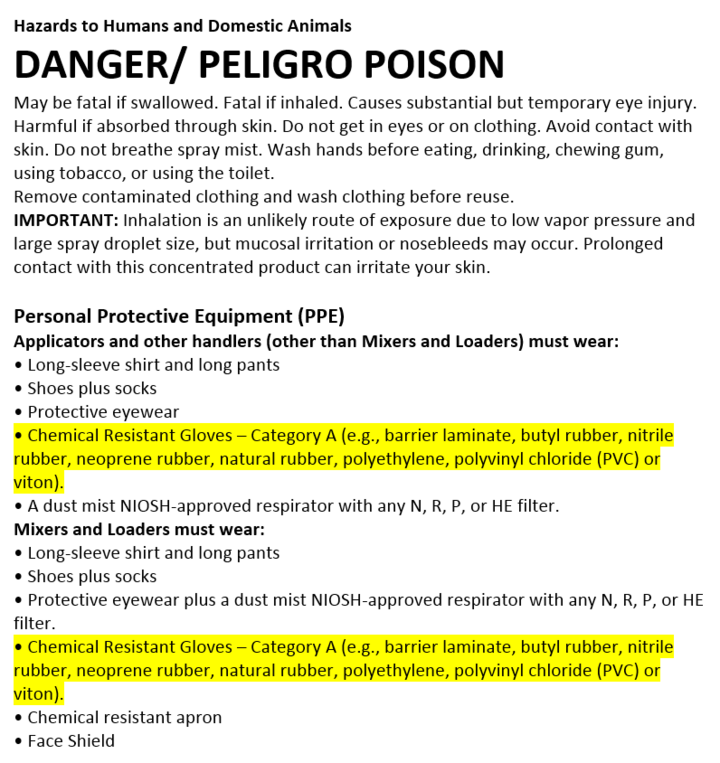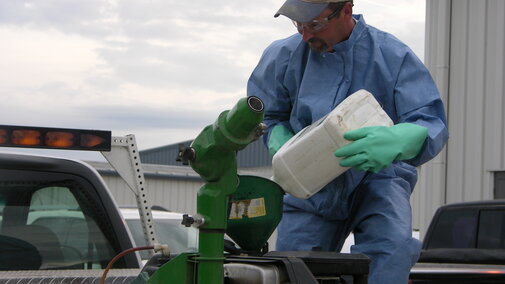One key to pesticide safety is literally in the palm of your hand: wearing proper gloves.
In 2011 the Agricultural Health Study reported that study participants who used the herbicide paraquat or insecticide rotenone were twice as likely to develop Parkinson’s as were people who didn’t. AHS has studied more than 89,000 farmers and their spouses since 1993 and continues to serve as a benchmark for agricultural health issues.
A 2015 AHS study update reports that wearing chemical-resistant gloves and changing clothes after using pesticides may help prevent Parkinson’s. The study showed that Parkinson’s was associated with applicators who did not wear gloves when applying paraquat or the insecticide permethrin. Parkinson’s was not associated with applicators who regularly wore gloves.
Gloves are only one part of the personal protective equipment (PPE) stipulated by the pesticide label to help pesticide handlers and applicators protect themselves.
At minimum PPE calls for gloves, long pants, a long-sleeved shirt, shoes, and socks. How do you know what else to wear, such as goggles, respirators, and aprons?
The simple answer is: Check the label. The pesticide label is a legal document with all the details of using a particular product, including what gloves and other PPE to wear.
More on PPE
See the Nebraska Extension NebGuide, Protective Clothing and Equipment for Pesticide Applicators.
The Right Glove for the Job
All gloves are not the same. Chemical-resistant gloves, for example, are made of barrier laminate, butyl rubber, nitrile rubber, neoprene rubber, natural rubber, polyethylene, polyvinyl chloride (PVC), or Viton®.
Glove Recommendations


- Water-resistant is not chemical-resistant. Typical household, cotton, or leather gloves should never be used for protection from pesticides.
- Never re-use any disposable, one-time use gloves or other PPE.
- Glove length — such as elbow-length — also may be specified on the product label.
- Chemical-resistant gloves for use with pesticides are unlined, to prevent the lining from absorbing any pesticide and transferring it to the wearer’s skin.
- Before removing gloves, wash thoroughly with soap and water. Then, carefully remove gloves without touching skin or the glove’s interior.
- Pesticide product labels undergo scheduled reevaluations and can be changed at any time —even within a season — due to new research and/or regulatory requirements. That’s why it’s imperative to read the entire label every time you buy a pesticide product and always follow label directions.
Agricultural Health Study
In February 2017, the AHS also reported that farm workers who have had a high pesticide exposure event — such as a spill — are more likely to experience molecular changes to DNA that may lead to certain cancers.
Other AHS studies are ongoing with pesticides and potential memory loss and kidney disease.
The Agricultural Health Study is a prospective study of cancer and other health outcomes in a cohort of licensed pesticide applicators and their spouses from Iowa and North Carolina. The AHS began in 1993 with the goal of answering important questions about how agricultural, lifestyle, and genetic factors affect the health of farming populations. The study is a collaborative effort of investigators from the National Cancer Institute, the National Institute of Environmental Health Sciences, the Environmental Protection Agency, and the National Institute for Occupational Safety and Health.
More than 89,000 farmers and their spouses in Iowa and North Carolina have been involved in the study since 1993.
Pesticide Safety Resources
Nonemergency
The National Pesticide Information Center800-858-7378
http://npic.orst.edu/
Emergency
Nebraska Regional Poison Center800-222-1222
http://www.nebraskapoison.com/about.aspx

